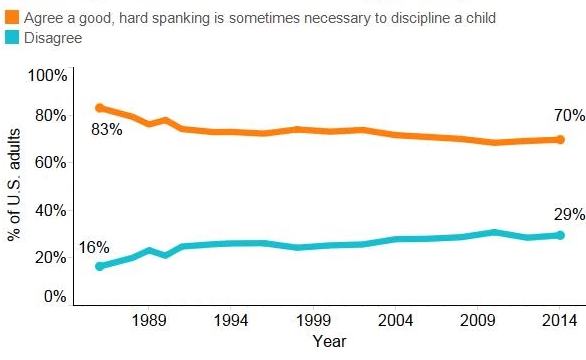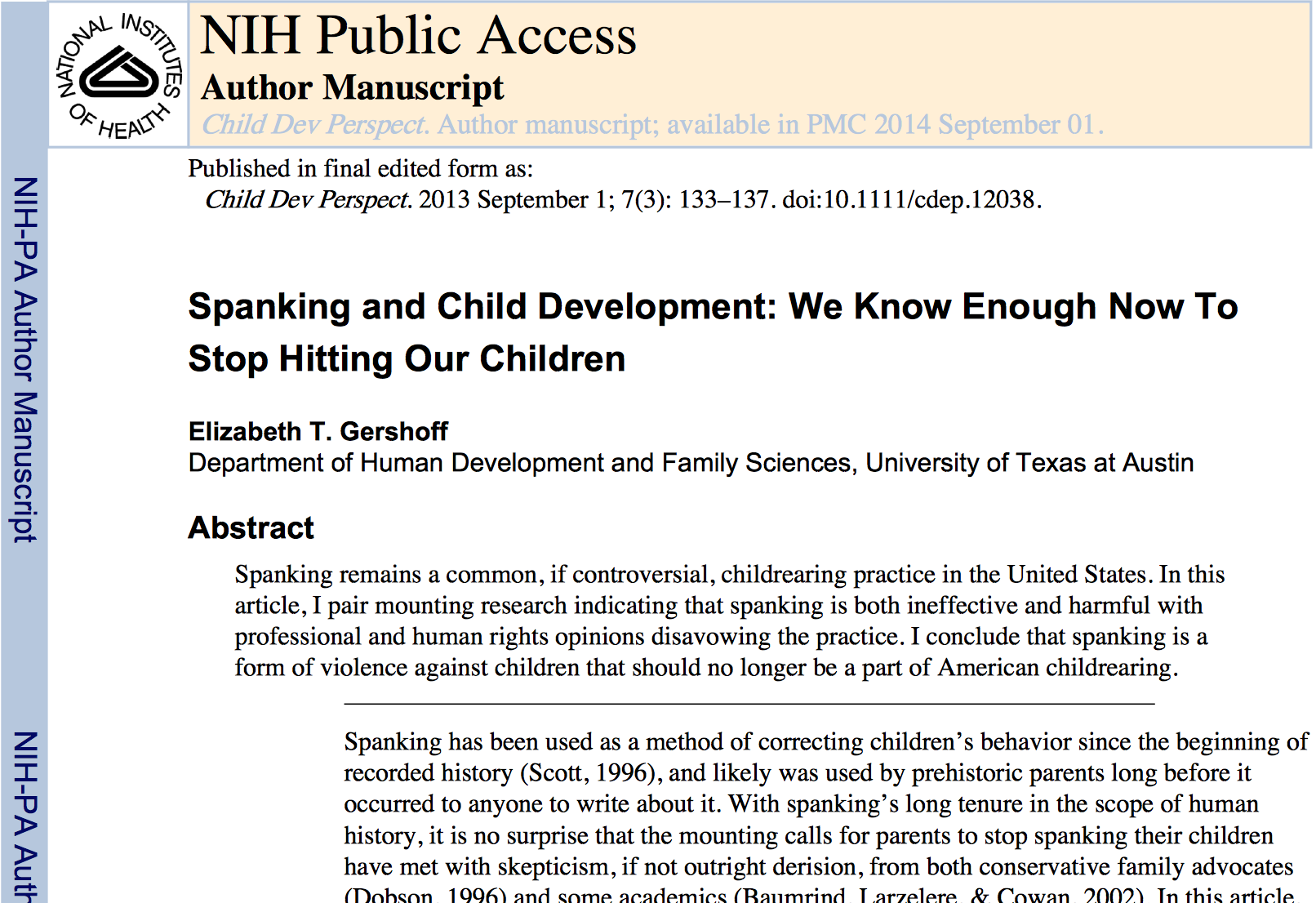RESEARCH
Formal Policy Statements
The American Academy of Pediatrics (AAP) states that spanking is harmful to children and should never be used.
The Centers for Disease Controlhas published a technical package addressing ending violence against children calling for both educational and legislative action to end the practice of corporal punishment in the home and to promote positive parenting.
The National Women’s Law Centeralong with 79 organizations has written a formal letter to local and state educational agencies and policymakers calling for an end to corporal punishment in schools.
American Professional Society on the Abuse of Children(APSAC), 2016 APSAC is committed to ending all abuse of children and promoting children’s welfare. Given the research evidence about the harms associated with corporal punishment, APSAC opposes hitting children for discipline or other purposes. APSAC calls for the elimination of all forms of corporal punishment in part because it increases children’s risk for physical abuse.
The National Association of Pediatric Nurse Practitioners(NAPNAP) believes that to achieve a healthy environment for children it is necessary to eliminate corporal punishment in schools and other settings where children are cared for or educated. In addition, parents must be educated about harmful effects of CP and instructed about effective alternative forms of discipline.
American Psychoanalytic Association(APsaA) condemns the use of physical punishment (corporal punishment) in the discipline of children and recommends alternative methods that enhance children’s capacities to develop healthy emotional lives, tolerate frustration, regulate internal tensions, and behave in socially acceptable ways.
Cornel University, College of Human Ecology strongly opposes striking a child for any reason. Spanking is NEVER recommended.
A look at the research and the neuroscience…
Drs. Murray Straus and Elizabeth Gershoff, leading researchers on the practice of corporal punishment, warn, “The research is clear – parents should NEVER spank their children.”
Dr. Martin Teicher, Neuroscientist and Researcher on Early Abuse & Neglect and Brain Development discusses the effect of spanking on brain development.
Dr. Elizabeth Gershoff discusses the most recent research, 2016
Attitudes, beliefs, and perceived norms about corporal punishment and related training needs among members of the “American Professional Society on the Abuse of Children”
September 2017, Catherine A. Taylor, Julia M. Fleckman, Shawna J. Lee
A randomized controlled trial of an intervention program to Brazilian mothers who use corporal punishment
September 2017, Paolla Magioni Santini, Lucia C.A. Williams
How do parents label their physical disciplinary practices? A focus on the definition of corporal punishment
September 2017, Sabrina Fréchette, Elisa Romano
Researchers Deserve a Better Critique: Response to Larzelere, Gunnoe, Roberts, and Ferguson
March 2017, George Holden, Andrew Grogan-Kaylor, Joan Durrant & Elizabeth Gershoff
The relationships between harsh physical punishment and child maltreatment in childhood and intimate partner violence in adulthood
May 2017, Tracie Afifi, Natalie Mota, Jitender Sareen and Harriet MacMillan
Spanking and adult mental health impairment: The case for the designation of spanking as an adverse childhood experience
Afifi, Traci, Derek Ford, et al; Journal of Child Abuse & Neglect
Reciprocal Relations between Harsh Discipline and Children’s Externalizing Behavior in China: A 5-Year Longitudinal Study
February 2017, Meifang Wang, Child Development
Spank, Slap, or Hit? How Labels Alter Perceptions of Child Discipline.
Risks of harm from spanking confirmed by analysis of 5 decades of research
Elizabeth T. Gershoff, Andrew Grogan-Kaylor. Spanking and Child Outcomes: Old Controversies and New Meta-Analyses.. Journal of Family Psychology, 2016
Hugs, Not Hits: Warmth and Spanking as Predictors of Child Social Competence
Elizabeth Gershoff, Shawna Lee, Inna Altschul, Journal of Marriage & Family
Parents’ Primary Professional Sources of Parenting Advice Moderate Predictors of Parental Attitudes toward Corporal Punishment
Catherine Taylor, Journal of Child and Family Studies
Parental Warmth Does Not Remove Anxiety that Follows Punishment
March 16, 2015, Jennifer E. Lansford et al, Journal of Clinical Child & Adolescent Psychology
The Link Between Domestic Violence and Spanking,
Save the Children & The Global Initiative to End All Corporal Punishment of Children
Trends in Children’s Exposure to Violence
JAMA Pediatrics, April 28, 2014, David Finkelhor, PhD
Parental spanking of 1-year-old children and subsequent child protective services involvement
Child Abuse & Neglect, March 3, 2014, Shawna Lee, Andrew Grogan-Taylor
Eavesdropping on the Family: A Pilot Investigation of Corporal Punishment in the Home
American Psychological Association, February, 2014, George Holden, PhD
The Abolition of the Parental Right to Corporal Punishment.
KRIMINOLOGISCHES FORSCHUNGSINSTITUT NIEDERSACHSEN E.V., 2014, Christian Pfeiffer, PhD. Criminological Research Institute of Lower Saxony, Hanover, G.ermany
Experience of Parental Corporal Punishment in Childhood and Adolescence and its Effect on Punitiveness
Stefanie Kemme, Christian Pfeiffer, Journal of Family Violence
Early parental physical punishment and emotional and behavioral outcomes in preschool children
Child: Care, Health, and Development, February 24, 2013, S. Scott, J. Lewsey, L. Thompson, P. Wilson
Harsh Physical Punishment in Childhood and Adult Physical Health
Afifi, Tracie, Pediatrics, July 2013; DOI: 10.1542/peds.2012-4021
Research findings can change attitudes about corporal punishment
Child Abuse & Neglect, November 16, 2013, George Holden
Normal spanking in preschool years linked to increased aggression and poorer receptive vocabulary at age
Spanking and Development Across the First Decade of Life, Pediatrics, October 21, 2013, Michael J. MacKenzie, PhD
Maternal Warmth is Not Enough
Does Maternal Warmth Moderate Longitudinal Associations Between Maternal Spanking and Child Aggression in Early Childhood?, American Psychological Association, January, 2013, Gershoff, E.
Concise Summary: Spanking and Child Development: We Know Enough Now to Stop Hitting Our Children
Child Development Perspectives, Vol 7, #3, November 2013, Gershoff, E.
Parental spanking and subsequent risk for child aggression in father-involved families of young children
Children & Youth Services Review. Sep 2013, Vol. 35 Issue 9, p1476-1485. 10p, Lee, Shawna; Taylor, Catherine
Corporal Punishment and Verbal Insults Increase Risk for Cancer, Heart Disease, and Asthma into Adulthood
Journal of Behavioral Medicine, September 2012, Michael E. Hyland, Ahmed M. Alkhalaf, Ben Whalley
Canadian Medical Association Journal Summary on Physical Punishment
Summary Analysis of the last 20 years of research on the effects of physical punishment on children.
Physical Punishment and Mental Health Disorders
Tracie O. Afifi, et al, Results from a Nationally Representative US Sample. PEDIATRICS, Official Journal of the American Academy of Pediatrics
Editor-in-Chief of Canadian Medical Journal Association
Editor-in-Cheif calls for Ban on Spanking in Home based upon the Research
Spanking young children shows a transactional relationship increasing chance of more spanking (for boys) and cascading effect on future development from ages 1 – 3 and 3-5. Transactional and Cascading Relations Between Early Spanking and Children’s Social-Emotional Development
Journal of Marriage & Family, October 2012, Maguire and Gromoske
Physical punishment of children: lessons from 20 years of Research
Canadian Medical Association Journal, 2012, Joan Durrant PhD, Ron Ensom MSW RSW
Corporal Punishment and Child Behavioural and Cognitive Outcomes through 5 Years of Age: Evidence from a Contemporary Urban Birth Cohort Study
Infant and Child Development Inf. Child. Dev. 21: 3–33 (2012), MacKenzie, M
Forms of Spanking and Children’s Externalizing Behaviors (Spanking Causes Acting Out Behavior, particularly in boys)
Family Relations Apr 2012, Lansford, JE
Spanking Stimulates Genetic Predisposition toward Anti-Social Behavior
Physical punishment and childhood aggression: the role of gender and gene–environment interplay, Brian B. Boutwell, AGGRESSIVE BEHAVIOR, Volume 37, pages 559–568 (2011)
Who Spanks Infants and Toddlers? Evidence from the Fragile Families and Child Well-Being Study
Michael MacKenzie, et al Child Youth Serv. Rev. August 1, 2011, pgs.1364-1373
Children’s behavior problems were significantly greater when both verbal hostility and physical punishment were used. Parental Discipline and Child Behavior
The Pitzer College Student Journal of Psychology, Volume 1, Fall 2011, Tamara A. Hamai, Ann Isbell, and Lillian Ku,
Corporal punishment in schools showed reduced executive functioning, abstract thinking, delayed gratification. Suggests that a punitive environment not only fosters increased dishonesty but also children’s abilities to lie to conceal their transgressions.
Effects of a Punitive Environment on Children’s Executive Functioning: A Natural Experiment
University of Toronto Social Development, Volume 20, Issue 4, pages 805–824, November 2011
Victoria Talwar, McGill University, Stephanie M. Carlson, University of Minnesota and Kang Lee
Mothers’ Spanking of 3-Year-Old Children and Subsequent Risk of Children’s Aggressive Behavior
Pediatrics 2010; 125:5 e1057-1065, Catherine A. Taylor, Jennifer A. Manganello, Shawna J. Lee, and Janet C. Rice
Corporal Punishment of Children
Duke Law, Law & Contemporary Problems, Volume 73, Number 2 (Spring 2010)
- Prevalence, Societal Causes, and Trends in Corporal Punishment by Parents in World Perspective; Murray A. Straus
- More Harm Than Good: A Summary of Scientific Research on the Intended and Unintended Effects of Corporal Punishment on Children, Elizabeth T. Gershoff
Spanking Linked to Physical Child Abuse
Corporal Punishment and Physical Abuse: Population-Based, Trends for Three to Eleven Year Old Children in the United States
Child Abuse Review Vol. 20: 57–66 (2011), Published online 18 June 2010 in Wiley Online Library, (wileyonlinelibrary.com) DOI: 10.1002/car.1128, Adam J. Zolotor
Spanking is Linked to Smaller Pre-frontal Cortex in Young Adults
Reduced Prefrontal Cortical Gray Matter Volume in Young Adults Exposed to Harsh Corporal Punishment, NeuroImage, Volume 47, Supplement 2, August 2009, Pages T66–T71, Akemi Tomoda, MD, PhD, Ann Polcari, PhD and Martin H. Teicher, MD
Corporal Punishment is Correlated to Lower IQ
Dr. Murray Straus, Family Research Laboratory, University of New Hampshire
Report on Physical Punishment in the United States: What Research Tells Us About Its Effects on Children
Columbus, OH: Center for Effective Discipline, Gershoff, E.
Joint Statement on Physical Punishment of Children & Youth
This is a summary analysis of research on physical punishment published by the Children’s Hospital of Eastern Ontario, CANADA
Children Should NEVER Be Spanked
Dr. Murray A. Straus, Family Research Laboratory, University of New Hampshire
What Parents Believe About Children Links to Chance of Hitting Them. Attitudes Predict the Use of Physical Punishment: A Prospective Study of the Emergence of Disciplinary Practices
Pediatrics June 2006, 117:6 2055-2064; doi:10.1542/peds.2005-2204, Brigitte Vittrup, George W. Holden, & Jeanell Buck
Spanking in Early Childhood and Later Behavior Problems: A Prospective Study of Infants and Young Toddlers
Pediatrics 2004; 113:5 1321-1330
Eric P. Slade and Lawrence S. Wissow
Spanking Infants Causes Cortisol Problems
Dr. Bugental, The hormonal costs of subtle forms of infant maltreatment, Department of Psychology, University of California, Santa Barbara; US National Library of Medicine National Institutes of Health; January 2003
Sweden banned spanking in the home in 1979, and has conducted a 30-year-long longitudinal study to understand its results….
SWEDEN’S Ban of Spanking Since 1979
What are the outcomes from the ban on spanking in Sweden over thirty years later? Read the longitudinal study by Sweden’s Ministry of Health & Social Affairs.
Spanking Infants and Toddlers: Maternal Belief and Practice
Pediatrics Vol. 95 No. 1 January 1, 1995 pp. 105 ‐111
Rebecca R. S. Socolar, Ruth E. K. Stein



